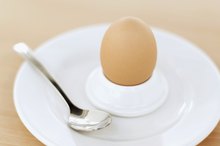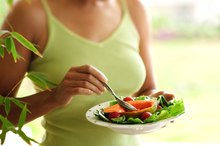Can You Have a Salad for a Post-Workout Meal for Women?
What you eat following a workout is imperative to assisting in muscle recovery and repair to aid in growth and prevent soreness, fatigue and risk of injury. A salad that is well-balanced among the major food groups can meet post-workout nutrition requirements to improve your overall health and prevent weight gain or unnecessary weight loss. Consult a health professional prior to making any dietary changes that may affect your health.
If you are experiencing serious medical symptoms, seek emergency treatment immediately.
Post-Workout Nutrition
Following a workout, your body requires proper nutrition and adequate rest to aid in rebuilding torn muscle fibers from physical activity. A combination of protein and complex carbohydrates is recommended to be consumed within 60 minutes post-workout with a larger meal eaten within one to three hours. Shortly after you work out, your muscles are most readily able to absorb nutrients that aid in growth and repair processes. Protein-rich foods build muscles to increase size and strength while carbohydrates restock depleted glycogen stores to increase energy levels. Often, a small snack such as a liquid protein shake is easily absorbed into the body and most convenient at this time.
However, if you have time to sit down for a proper meal, a salad made with the right ingredients can be consumed. Alternatively, follow up your post-workout snack with a meal that includes a salad an hour or two later.
Protein
Which Types of Pasta Raise Blood Sugar?
Learn More
A post-workout salad should include a serving of protein to avoid breakdown of muscle leading to fatigue, lethargy, weakness and wasting over the long-term. Healthy options to include in a vegetable-based salad include a serving of lean chicken or turkey breast chopped or shredded; lean beef; salmon, tuna or sardines; and chopped, hard-boiled eggs. Non-animal protein alternatives include lentils, beans, nuts and seeds as well as tofu and tempeh.
Carbohydrates
Inadequate carbohydrate intake post-workout can lead to fatigue, weakness, nausea, dizziness and difficulty concentrating. Complex carbohydrates should be selected over refined and processed carbohydrates, which are stripped of their nutrients, have added sugars and less nutritional value. Complex carbs are rich in essential nutrients, vitamins and minerals and are also a source of dietary fiber, which stabilizes blood sugar levels to prevent hunger and aids in digestive regulation. Add a serving of whole grains to your salad such as brown rice, quinoa, millet or barley with a slice of whole-wheat bread on the side.
The base of your salad should consist of vegetables, which are low in calories and fat, but high in essential vitamins and minerals needed for good health. Use dark, leafy greens such as kale, spinach, chard with peppers, onions, mushrooms, carrots and squash for a healthy post-workout salad meal.
Healthy Fats
Good Post Workout Foods for Weight Gain
Learn More
Following a workout is the best time to consume foods that are a source of fat. Eating fattier foods prior to a workout can interfere with digestion by delaying gastric emptying. In addition to contributing to a too-full feeling and sluggishness, your body diverts blood to the stomach for digestion vs. the muscles which are in need of oxygen and nutrients during a workout.
Post-workout, healthy fats will not interfere with physical activity performance as you are resting. Healthy fats are needed in your body for normal body processes, hormonal balance and the absorption of vitamins. Avoid unhealthy saturated and trans-fats that increase the risk of heart disease and stroke. Add a small serving of olive or canola oil to your salad by drizzling it lightly over the finished product; crush almonds over greens; or toss in a handful of sesame and sunflower seeds.
Related Articles
References
- Harvard School of Public Health: Fats and Cholesterol: Out with the Bad, In with the Good
- Complete Idiot's Guide To Total Nutrition, Fourth Edition; Joy Bauer, M.S., R.D., C.S.N.
- Nancy Clark's Sports Nutrition, Fourth Edition; Nancy Clark, M.S., R.D.
Writer Bio
Jennifer Andrews specializes in writing about health, wellness and nutrition. Andrews has a Master of Science in physical therapy from the University of Alberta as well as a bachelor's degree in kinesiology. She teaches yoga and pilates and is a recent graduate of the Institute of Integrative Nutrition.









